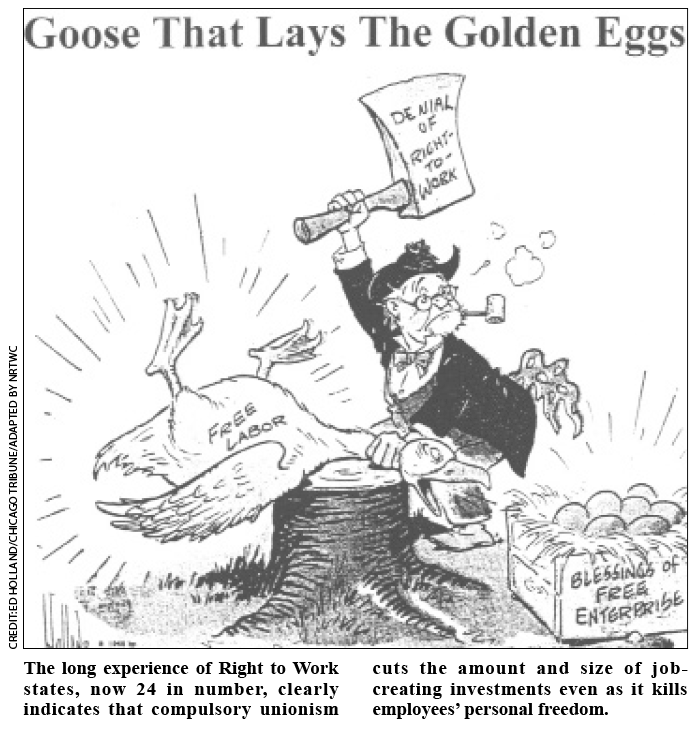Will Team Biden Weaponize Workers’ Pensions?
Big Labor abuse of worker pension and benefit funds as a means of advancing union bosses’ self-aggrandizing policy objectives is a familiar phenomenon.
Two Newest Right to Work States Enjoy Out-Sized Employment Gains
(Source: November-December 2014 National Right to Work Committee Newsletter)
As the National Right to Work Newsletter reports in detail elsewhere in this issue (see the article starting on page eight), state public officials who helped pass the two most recent Right to Work laws in Indiana and Michigan and/or promised to help keep these laws on the books were rewarded by voters on November 4.
 Many of the Hoosiers and Michiganders who lobbied for enactment of their state Right to Work laws and continue vigilantly fighting to protect them from Big Labor attacks have always believed their states would benefit economically from rolling back union bosses’ special privileges.
Many of the Hoosiers and Michiganders who lobbied for enactment of their state Right to Work laws and continue vigilantly fighting to protect them from Big Labor attacks have always believed their states would benefit economically from rolling back union bosses’ special privileges.
And more and more data are now coming out that indicate Right to Work is indeed furnishing much needed boosts for employees and businesses in the two Midwestern states.
One compelling example pertains to manufacturing employment.
While the total number of factory jobs in the U.S. as a whole has rebounded only modestly since payrolls bottomed out in 2010, Right to Work states as a group have enjoyed out-sized gains.
Manufacturing Jobs in Hoosier State Are up By 8.9% Since March 2012
And Indiana’s record since its Right to Work law took effect in March 2012 is extraordinary.
From that month through October 2014 (the latest month for which state jobs data are available as this edition of the Newsletter goes to press), seasonally-adjusted factory payroll employment grew by 8.9% in Indiana, by 3.6% in Right to Work states as a group, and by just 0.8% in forced-unionism states as a group.
Indiana’s manufacturing job percentage gain was the third greatest of any state’s, and far exceeded those of all of the remaining forced-unionism states in the Midwest.
(Since seasonally-adjusted monthly jobs data are not available for Alabama and Oklahoma, they are excluded from all the analyses in this article.)
Michigan’s Right to Work law did not take effect until a year later than Indiana’s.
But its record over the past year and a half is impressive.
Detroit, Grand Rapids Are ‘Beginning to Shed Their “Rust Belt” Reputation’
From March 2013 through October 2014, Michigan’s manufacturing payroll job gain of 3.3% was the 11th highest in the nation.
Overall, during that period, Right to Work states had a factory job increase of 2.4%, and forced-unionism states had an increase of just 0.6%.
In the Midwest alone, Michigan’s percentage manufacturing job gain was roughly double the average for forced-unionism states.
As a recent analysis by Michigan business reporter Jim Harger noted, Detroit and Grand Rapids, the Wolverine State’s two largest cities, “are beginning to shed their ‘rust belt’ reputation for a shinier, high-tech image that emphasizes growth in advanced manufacturing and engineering jobs.”
And the evidence strongly indicates the state’s popular Right to Work law is playing a major role in helping Michigan transform itself.
Mark Mix, president of the National Right to Work Committee, cautioned that repairing the damage that federally-imposed compulsory unionism did to Indiana and, to an even greater extent, Michigan over the course of three-quarters of a century will take time:
“I expect the good economic news to keep coming in from America’s 23rd and 24th Right to Work states. However, it may take some years before they are fully competitive with states where employees have enjoyed Right to Work protections for decades.
“But Indiana and Michigan are now clearly headed in the right direction.”

Big Labor abuse of worker pension and benefit funds as a means of advancing union bosses’ self-aggrandizing policy objectives is a familiar phenomenon.

Leaked CTU Proposals Won’t Do Anything to Improve Schools’ Poor Performance

What impact does handing a union monopoly power to deal with your employer on matters concerning your pay, benefits, and work rules have on your pay?